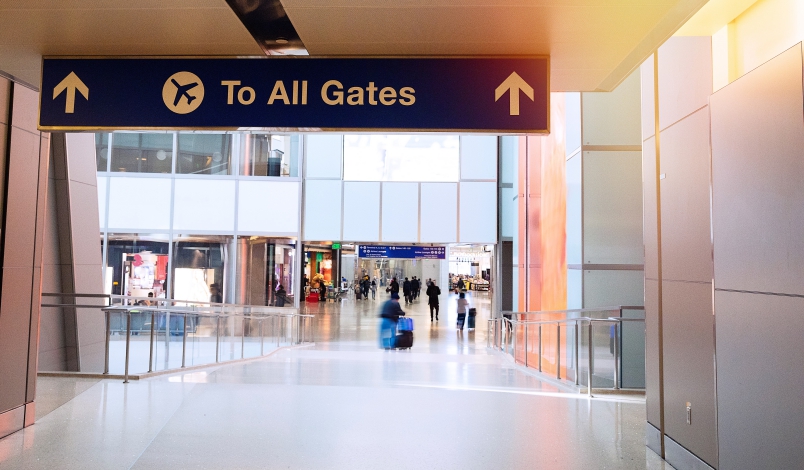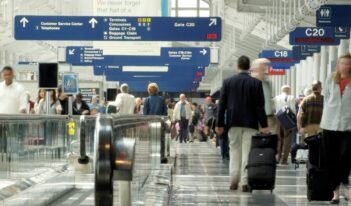
Advocates say a vaccine mandate for domestic flights could help keep travelers safe.
Boarding pass. Photo ID. Vaccine card?
At some point, travelers may need to present all three of these documents to board planes. Over the past several months, federal, state, and local policies have started to require that individuals show proof of vaccination against COVID-19 to work or participate in certain activities. Most recently, President Joseph R. Biden announced a requirement for most incoming international travelers to show proof of vaccination.
Top Biden Administration officials have floated the idea of implementing a similar mandate for passengers boarding domestic flights. Some questions remain, however, about the legality and feasibility of a vaccine mandate for domestic air travel in the United States.
Advocates for a mandate point out several benefits. They claim that a vaccine mandate would help keep the millions of travelers who fly each day safe. Studies show that vaccinated individuals are around half as likely to transmit the coronavirus, meaning a vaccine mandate could cut down the risk of transmission during travel. Mandate supporters also argue that a vaccine mandate for air travel would generally encourage vaccinations.
Scholars claim that at least two federal agencies possess the ability to issue a vaccine mandate for flyers under their existing authority.
Federal law allows the Centers for Disease Control and Prevention (CDC) to take necessary steps to prevent the spread of “communicable diseases … into the United States and between states.” The CDC used this authority in January 2021 when it issued a mask mandate for public transportation to reduce the spread of COVID-19. Scholars claim the CDC could require vaccines for flyers under the same justification.
But the CDC does not hold unlimited authority under this provision. The U.S. Supreme Court recently held that the CDC lacked the authority to impose a housing eviction moratorium that it implemented during the COVID-19 pandemic, finding that the agency construed its authority to prevent the spread of disease too broadly. With an air travel mandate, the CDC would likely have to show that the measure directly prevents the spread of COVID-19.
The Federal Aviation Administration (FAA) might also have authority to issue a vaccine mandate for air travel because it holds broad power to regulate air safety. Recent court decisions permit the FAA to issue regulations to protect the health of airplane passengers and airline staff and employees. Although the FAA has traditionally used its powers to justify narrower actions, such as requiring medical equipment on planes, a vaccine mandate could fall under this broad authority.
Regardless of which federal agency were to act, implementing a vaccine mandate for flyers may prove logistically difficult. The United States lacks a centralized vaccine database like the systems developed in other countries, raising questions of how the federal government would verify vaccination status based only on paper cards. Already, instances have surfaced of passengers using fake vaccination cards for international travel.
In addition, religious exemptions pose a potential obstacle to a federal vaccine mandate for flyers because some say that getting vaccinated violates their religious beliefs. Some scholars suggest that federal vaccine mandates could infringe on the Religious Freedom Restoration Act, which prohibits any federal law from substantially burdening the free exercise of religion. Although the Supreme Court has traditionally upheld vaccine mandates in the face of religious challenges, the current court has shown a willingness to strike down other COVID-19 restrictions affecting the exercise of religion.
Despite these issues, one state has already acted. For months, Hawaii has required travelers to show proof of vaccination or a negative COVID-19 test on arrival to the state.
Although Hawaii’s policy at first led to long lines, the experience has since become smoother. Harsh penalties in Hawaii also deter travelers from lying—those caught with fake cards face up to $5,000 in fines and a year in prison.
Hawaii provides an instructive example of how the federal government could include a testing exemption within any vaccine mandate for flyers. Allowing travelers to test out of the vaccination requirement could allow for religious or other objections while still reducing the spread of COVID-19. It would also conform with a vaccine mandate issued by the Occupational Safety and Health Administration on large businesses that would allow employees to opt out through weekly testing.
But a testing exemption could cut down the incentive for flyers to get vaccinated. Furthermore, requiring unvaccinated flyers to get a COVID-19 test could further burden the already strained supply of rapid COVID-19 tests in the United States. Any testing exemption would presumably need to take these realities into account.
If the federal government overcomes these legal and logistical hurdles, a vaccine mandate for domestic flyers might be the next step regulators take to combat the spread of COVID-19. Future travelers may want to keep their vaccine cards handy.



